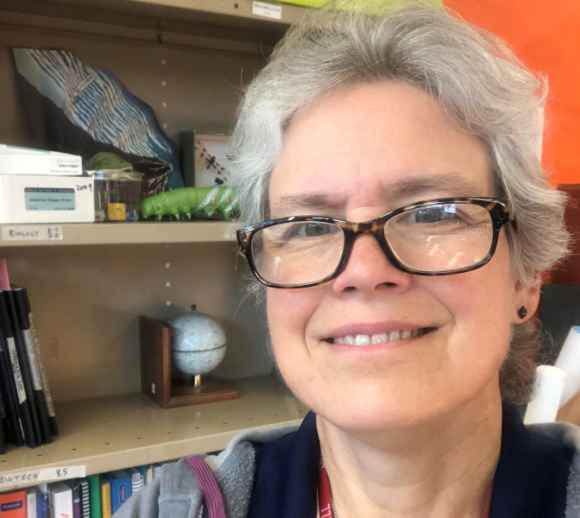"I am optimistic that the experiences that students had during this pandemic will make them better adapted for changes in the future."
Bonnie Daley, Author
We have had distance learning for the entire school year. My biotechnology class is made up of high school juniors and seniors.
I started the year trying to take the labs that we did in the past when we were in the classroom and adapting them to work in distance learning. This required typing up Google Docs, including helpful videos or links to interactive websites where students could practice actual lab techniques. We also included quite a bit of time talking about health disparities in society, and students investigated a particular group and reported to the class about the challenges they face. The groups included gender, ethnic, and economic disparities. This was a great lead-in to the ABE unit on clinical trials.
For the second semester, we have focused on plant biotechnology, which has enabled the class to investigate plant propagation at home with cut-up vegetables or seeds. Normally I would do an extensive unit on plant biotechnology with several extended investigations such as propagating cuttings and growing fast plants. We were able to learn about growing fast plants by using the Explore Learning Gizmo lesson. This led into reading Braiding Sweetgrass by Robin Wall Kimmerer, and students reflected on indigenous farming practices. Currently, we are looking at GMOs and PCR. The Bay Area Bioscience Education Community has some great online lessons that I use that allow students to do many labs digitally. They've done a great job of putting these together for us.
As the year has gone on, several students in my 34-student class have experienced mental health issues such as depression. This has been a challenge for me, as I have been unable to interact with the students in person. It's hard to know who is really suffering. There aren't many warning signs when we are totally remote. And if students don't respond to emails or phone calls, there are few options for communication.
In the future, I anticipate that some of the things we learned from distance learning can help improve the educational experience. The pandemic has shown us that there is so much work to be done to ensure equity and access for all. We definitely need every student to have access to the internet. All students should have a laptop. Providing the lessons online as well as in person will be a time-consuming process, but I believe that eventually we need to go this way.
I anticipate that the future of education will be to offer a blended learning experience. I do have some students who did quite well with distance learning. They seemed to thrive without the distractions of the in-person classroom. In high school, we have always had students who need to start working because of family businesses or economic hardship. The blended learning approach would better suit their needs.
I am optimistic that the experiences that students had during this pandemic will make them better adapted for changes in the future. Most children are resilient, but I am concerned about those children who are less resilient. Will the deficits they suffered in this year and a half handicap them for the rest of their educational years and perhaps for their lives?
I am optimistic about what teachers have learned during this time. They will have a better grasp of digital resources and how to implement them. And I believe our curriculum specialists have done a great job of helping us with lesson plans, slide shows, and professional development that would have looked very different had we still been in the classroom.
Overall, I have mixed feelings about the past year and a half. I liked teaching remotely in some ways; I had time for other personal concerns such as eating better, getting more exercise, and taking care of family because I wasn't at school 10 hours a day. But at the same time, work creeped into my personal life at times in ways I wasn't happy with. Sub days were not really days off because no substitute could teach my classes. I've had to be online much more than I would like, and as a result, I have suffered eye strain and back problems. Hard to believe, but I actually looked forward to Mondays when I could see my students in Zoom class because I had spent the weekend alone in my apartment during lockdown.
All in all, my students have been amazing. I don't know how much they are paying attention, but they do attend my Zoom classes. They try their best to keep up. They are learning how to communicate with the teacher about their needs. Using Google Forms has enabled me to hear from them in ways I never did before. We have all learned to be more understanding of situations outside of our control and I believe this will carry into the future.
View other stories in the ABE Pandemic Teaching Stories series.
